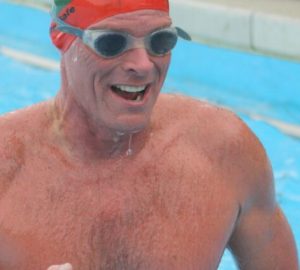Why it’s sometimes an advantage to be a less experienced swimmer
Have you noticed how sometimes the least experienced swimmers set themselves the most audacious goals? I gave some examples in our newsletter piece a couple of weeks ago (Things fall into place). I’ve also noticed how more experienced swimmers are often more cautious.
Take the English Channel for example. This is a swim that 20 years ago might have been the crowning achievement of a long-distance swimmer’s career. Now it’s something that virtual non-swimmers set as their first swimming goal, and sometimes they succeed. If it’s not the English Channel, it could be something equally tough and daunting.
We tweeted this the other day: “Just thinking, it’s sometimes people with the least experience who set the biggest swimming goals – and then go and achieve them.”
Chris Smith replied to say that described him completely: “I was 46 and couldn’t swim when I told friends that I was going to swim from Alcatraz. They laughed!”
He went on to complete the Alcatraz swim following months of intense training. “I had a fear of water so I prepared thoroughly. The hardest part was not getting to the end, it was getting to the start!”
Starting from nothing, non-swimmers can quickly proceed to swimming for hours at a time, in water temperatures well below those you’d find in a public swimming pool. And they find this a perfectly reasonable progression.
In contrast, I’ve come across many experienced and competent swimmers, people who can cover three or even four kilometres in an hour in a pool (and have been doing so for years) but have endless worries and reservations about open water, or would consider a 10km swim to be an ultra marathon.
It makes me wonder why non-experienced swimmers have fewer barriers to tackling long-distance open water swims that people who, at face value, are better swimmers. Here are some ideas I’ve come up with.
- In a club swimming environment, 200m and 400m are middle distances, 800m and 1500m are long distances – anything beyond this is extreme.
- If you’ve ever done a 400m or a 1500m race you will have a very vivid experience of how much discomfort you can cause yourself over these distances. It’s easy to imagine that longer distances will increase and extend that suffering.
- Club swimmers are usually trained and conditioned (physically and mentally) for sprints. Training is based around 50, 100 and 200m intervals (you should hear the groans if you ask a masters swim squad to swim 400m). They lack the experience and the mindset to settle in to a long distance swim.
- A regular club swimmer will know how tired an hour of swimming can make you. An intense training session can leave your arms feeling leaden for two to three days. If that’s what one hour feels like, how would they cope with 12, or 20?
- A pool swimmer will be accustomed to always being a few metres from a wall – anything more can cause anxiety.
- Regular pool swimmers will be accustomed to water temperatures of 26 to 31 degrees. 26 degrees actually feels cold if you’re used to 29. A first experience of 15 degrees will feel so shocking in comparison that you’d be forgiven for thinking you’d never get used to it.
- Pool swimmers often have a competitive approach to swimming, which is mostly inappropriate for long distance marathon swims where completion and overcoming the elements is the goal.
This is all baggage a non-experienced swimmer just doesn’t have. They have no idea just how hard a Channel swim might be whereas a club swimmer can more easily imagine it, and that’s enough to put them off.
Pool swimmers can naturally become open water swimmers, and they have a lot of advantages if they do, but their swimming experience can hold them back from taking on bold challenges.






